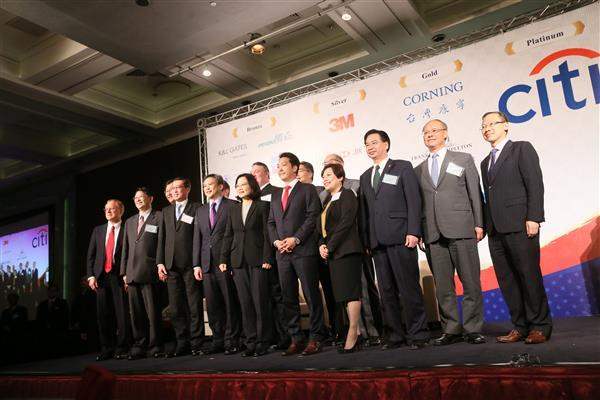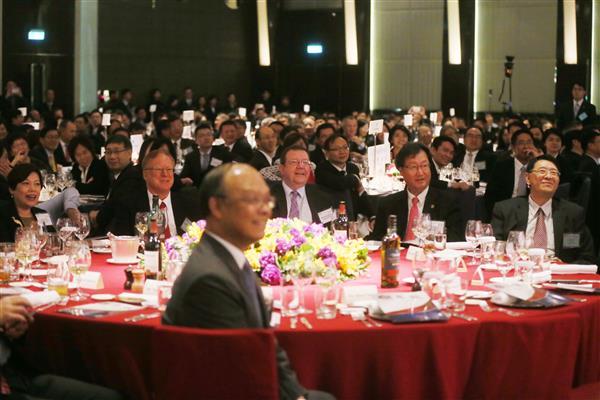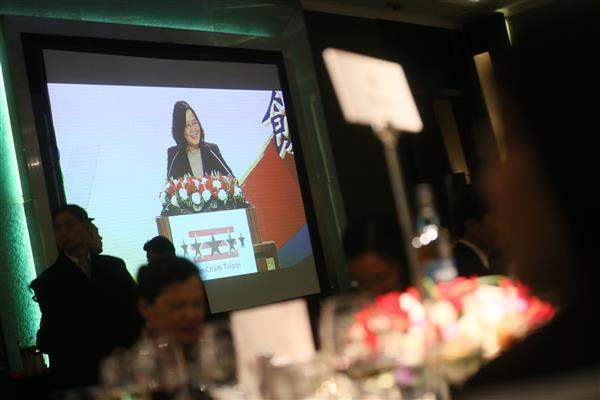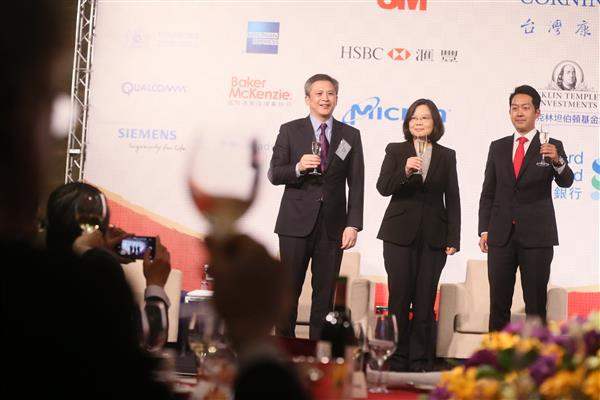News & activities
 News releases
News releases
On the evening of March 22, President Tsai Ing-wen attended the 2017 AmCham Hsie Nian Fan celebration. In her remarks, she affirmed that Taiwan and the US have enjoyed a deep friendship and hoped that the two countries will build an "upgraded" strategic partnership in regional security and greater exchanges in trade and economy.
A transcript of the president's remarks is as follows:
Good evening everyone! First of all I'd like to thank AmCham's Albert Chang for hosting this fine event. I understand it's a full house, it's much more crowded than I thought – and this is testament to AmCham's enduring leadership in Taiwan.
I'm pleased that my good friend AIT Director Kin Moy is here as well. And with me today we have Secretary-General of our National Security Council Joseph Wu (吳釗燮), and quite a number of our ministers. Initially I wanted to name them one by one, but since there are so many here, why don't you stand up and say hello to the people here (applause). I understand that we also have a lot of officials from the Taiwan government here, I don't know how many of you, but please also stand up (applause).
Since this is the first time I'm joining this event as president, I would like to begin with a few words of appreciation for AmCham Taipei.
For 66 years, this chamber has served as a vital bridge between Taiwan, the United States, and the business communities of our two countries. Your work has been instrumental in bringing us closer together.
For example, every year AmCham leads a "Doorknock" delegation to Washington, DC to meet with US officials, members of Congress, and the business community.
It's a great opportunity to share Taiwan's success story with the US, and to discuss future cooperation in trade and investment. Without these efforts, the Taiwan-US partnership would not be in the robust health it is in today.
Taiwan and the US enjoy a deep friendship that has stood the test of time. This is not only because we share many of the same values, but we have also forged, through decades of cooperation, a high level of mutual trust as partners.
From the US military defending Taiwan in the 1950s, to the passage of the Taiwan Relations Act in the 1970s, the US has always been the primary force supporting Taiwan and stability in the Taiwan Strait. America's security commitment and arms sales to Taiwan are a key factor in maintaining the cross-strait status quo.
On Taiwan's part, since we embraced freedom and democracy, and became economically prosperous, Taiwan has actively taken on responsibilities and played a constructive role in the region. When it comes to security and development in the Asia-Pacific, there is no doubt that Taiwan and the US share joint responsibilities and common interests.
The US has also been Taiwan's most important economic partner. It was Taiwan's largest trading partner and export market in the 1980s, accounting for nearly half of our exports. Today, the US is still Taiwan's 2nd largest trading partner, with bilateral trade in goods and services reaching US$85 billion. If we include indirect trade through third-parties, the US is still the most important export market for Taiwan.
Taiwan's economy has long been benefitting from exports to the US; but to be clear, our bilateral trade is mutually beneficial.
Through bilateral trade and investment, Taiwan has created more than 350,000 job opportunities in the US. We are the 15th largest external job creator for the US and the 6th largest in Asia.
But even more importantly: within the global supply chain and especially the ICT sector, an irreplaceable, strategic industrial alliance has emerged between American and Taiwanese firms and their subsidiaries in third countries.
This alliance has brought an array of American brands and products to people all over the world, and tremendous profits to the US. It's no exaggeration to say that such cooperation is a powerful force behind "Buy America".
Looking back on our decades-long friendship and partnership, I am confident to say that Taiwan is a crucial and irreplaceable security and economic partner for the US.
A little more than 2 months ago, a new American administration took office. With this, we have entered a new stage of Taiwan-US relations.
We hope to build an "upgraded" strategic relationship between our two countries. This includes a more strategic partnership in regional security, more comprehensive cooperation, and greater mutual trust. I am confident that we can achieve these objectives.
My confidence is based on the following:
First, Taiwan is ready and prepared to play a more proactive role in ensuring regional peace and collective security.
In a few hours' time, our Representative to the US will participate in a ministerial meeting of the Global Coalition working to support efforts in Iraq and Syria. There, he will announce a new commitment of resources to support international mine-removal efforts. This follows Taiwan's donation of a mobile hospital this January to build on the stabilization work already taking place in Iraq.
We also want to ensure that Taiwan makes greater investment into our own defense – and that benefits peace and stability in the region.
We will seek greater cooperation with American defense firms as we build up our indigenous industry, in addition to the continuing purchase of arms necessary for Taiwan's defense.
Yesterday morning, I unveiled our Indigenous Defense Submarine program in Kaohsiung. It's a large and ambitious undertaking – but one that shows our determination in moving ahead on this agenda.
Two of the other areas are aerospace and cybersecurity. Not only will all of this create further investment opportunities, it will also potentially lead to thousands of new jobs here in Taiwan and in the US as well.
Second, faced with the new US administration's "America First" policy, Taiwan is prepared to make adjustments.
While we believe in free trade, we also support the idea of "fair trade".
As many of you know, I was a trade negotiator for a long time. I firmly believe that through communication and negotiation, trade conflicts and other differences can always be resolved.
With this in mind, Taiwan and the US should engage in bilateral discussions and trade negotiations as a matter of priority. Both sides should have frank and substantive discussions and work together towards a new bilateral trade agreement. Preferably, of course, FTA type.
In addition, we plan to send the largest-ever delegation to attend the SelectUSA Investment Summit this June. Members of the delegation include some of Taiwan's largest companies. They will actively seek out investment opportunities, particularly in manufacturing and other job creating industries.
In September, we will also organize an agricultural procurement delegation – cementing our status as one of the largest importers of US agricultural products.
Third, the economic reforms that we are undertaking also create greater space for strategic economic cooperation between Taiwan and the US.
To reduce our export dependence and also to accelerate industrial transformation, my administration has been promoting a "5+2" innovation program.
Later this week, the Executive Yuan will also announce a forward-looking infrastructure program, which includes government funding as well as large-scale investment by public and private enterprises. We are confident that this program will expand both domestic demand and Taiwan's future competitiveness.
This program offers great opportunities for Taiwanese and American firms to cooperate, and also offers immense potential for the purchase of American goods.
In addition to this, our Ministry of Economic Affairs has identified six sectors as the basis for further Taiwan-US cooperation. They are steel, semiconductors, petrochemicals, textiles, automobile components, and smart machinery. Our Asia Silicon Valley program in particular is directed at Silicon Valley and other innovation centers in the U.S. for further cooperation.
We are also actively promoting the New Southbound Policy to strengthen our linkages with Southeast and South Asian countries, and Australia and New Zealand in the areas of economics and trade, as well as science, technology and culture.
The focus is on sharing resources, talents, and markets in order to create greater prosperity for all. Taiwan and the US enjoy a high degree of complementarity when it comes to exploring emerging markets, and especially markets in the Asia-Pacific region.
If we could deepen our strategic alliance in this area, I believe this will boost American exports as well as growth in both of our economies.
Ladies and gentlemen, in a year where both Taiwan and the US are focusing on the economy, I hope that our concerted efforts will give rise to stronger and more sustained economic growth.
As key players in the Taiwan-US relationship, my administration looks forward to working with both AmCham and its members in a variety of policy areas, to multiply both opportunities and benefits.
Finally, I wish to thank you again for your invitation. I also want to wish AmCham another successful year– whatever you are doing, don't stop. And to AmCham members: if you want to invest more in Taiwan, now is the right time. My administration is more than ready and willing to work with you.
Thank you and have a great evening!
Let me then propose a toast.












